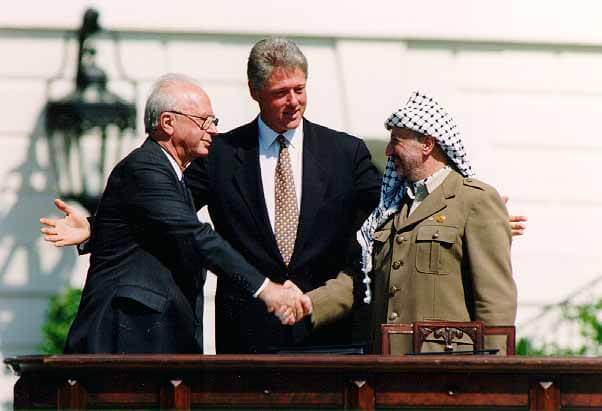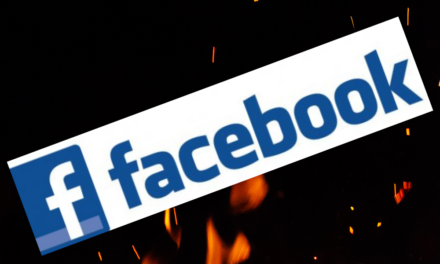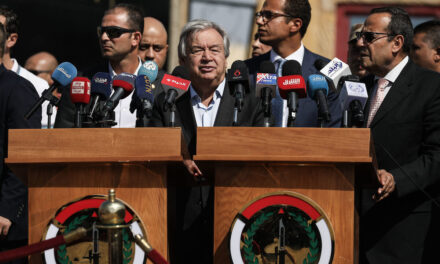ISRAELI PRIME MINISTER YITZHAK RABIN (LEFT), U.S. PRESIDENT BILL CLINTON (CENTER), AND PLO CHAIRMAN YASSER ARAFAT (RIGHT), DURING THE SIGNING OF THE OSLO ACCORDS, SEPTEMBER 13, 1993. (PHOTO: WIKIMEDIA COMMONS)
Israel is on trial for genocide in the International Court of Justice (the ICJ). The Prosecutor of the International Criminal Court (ICC) has requested arrest warrants for Israel’s leaders for crimes against humanity. Millions of people across the globe, Palestinians, Jews, Muslims, Christians, students, workers, and others, are mobilized to challenge Israeli settler-colonialism, apartheid, and genocide. The 76-year-old wall of impunity, built brick-by-brick by the US, the UK, and other Western governments, is beginning to crumble.
Further evidence of this came on July 19 when, in a stunning advisory opinion, the ICJ ruled that international law protects the rights of the Palestinians, and they need not negotiate with their oppressors for those rights under Oslo or any other political framework, dealing a definitive blow to decades of US and Western efforts to situate Israel outside the reach of the rule of law. With that simple declaration, the Court ended three decades of Israeli exceptionalism built on the ruse of Oslo as a barrier to the application of international law.
Still, the cause of human rights for the Palestinian people faces a steep climb. The Western-supported Zionist project in Palestine has had a decades-long head start in building its oppressive walls, both literal and figurative.
Laying the foundations of legal exceptionalism
One of those walls, the foundations of which were laid already in 1947 and 1948, is the wall of legal exceptionalism. Before the ink was dry on the Universal Declaration of Human Rights and the UN Genocide Convention, the nascent, western-controlled United Nations carved out an exception for Israel, which was to be effectively above the law.
In Palestine, this began with the forced partition of the land, which was in direct breach of international legal prohibitions on the acquisition of territory by force and on the denial of indigenous self-determination. This was followed by the abject failure of the UN and the West to intervene to stop the genocidal ethnic cleansing of Palestine that was the Nakba of 1947-1948. While critical resolutions and symbolic gestures in the UN would follow, the West set to work in earnest at the same time on aiding and arming Israel in order to make it impervious to the external dictates of international law, and on disempowering and dehumanizing the Palestinian people, to prevent any real internal threats to the colonial project.
When Western control of the United Nations General Assembly began to weaken in the late 1960s and 70s, as a result of the entry into the UN of a wave of newly independent states of the global south, the tide began to turn. The Palestinian people found new support for their struggle amongst newly independent states and the Soviet Union abandoned Stalin’s earlier pro-Zionist stance in favor of one in support of the indigenous Palestinians. At the UN itself, earlier declaratory positions on human rights were being codified into binding international treaties, the principle of self-determination emerged as a core global norm, and the movement for global decolonization was ascendant. As a result, even as the West doubled down in its support, Israel and its Zionist colonization of Palestine faced greater and greater isolation. By the 1970s, the UN had affirmed the right to resist foreign occupation, colonial domination and racist regimes, and had declared Zionism to be a form of racism and racial discrimination. The UN would establish special human rights mechanisms to monitor the human rights of the Palestinian people. These developments were chipping away at the Western project of Israeli exceptionalism and were beginning to threaten Israeli impunity.
But just as the international law-centered approach to Palestine was gaining ground, the end of the Soviet Union brought about a new unipolar era of largely unchecked US dominance. The U.S. and its Western allies went to work at insulating Israel from legal and human rights critique at the United Nations, revoking the resolution declaring Zionism to be a form of racism, and following the Madrid Conference with what would ultimately become the Oslo process, in which Palestinian rights would be at the discretion of their Israeli occupier and its US sponsor.
Thus, the 1990s began with a concerted effort by the US to sideline international law and human rights, which favored the Palestinian position, in favor of political negotiations, which the US would dominate, acting in Israel’s favor. The Palestinians were now forced, without the benefit of international law, to negotiate for their rights not only with those who were occupying and oppressing them, but also with the sole global superpower that was the closest ally of the occupier. The disempowerment of the Palestinian people was all but complete.
For three decades thereafter, the situation of Palestinians on the ground continued to deteriorate, as Israeli repression and settlement activity continued apace behind the smokescreen of Oslo. Indeed, the Oslo agreements were carefully crafted in part to prevent legal action against Israel for the violation of Palestinian human rights. Israel seized this opportunity of enhanced impunity to carry out thirty-plus years of land theft, evictions, settlement expansion, and persecution of defenseless Palestinians across the occupied territories. Oslo was, in essence, a war crimes bonanza.
For their part, the US and its Western allies deployed the entirety of their diplomatic, military, and economic power to buttress Israeli impunity and to insist that the application of international law to the issue was inappropriate and “unhelpful” to negotiations and peace.
Cracks begin to emerge
Cracks in Israel’s wall of impunity would emerge especially after a new, far-right government took power in Israel in 2023. That government, made up of a hodge-podge of some of the country’s most odious fascists, supremacists, settlers, and war criminals, would immediately abandon Israel’s (western endorsed) 75-year policy of incremental genocide, in favor of one of expedited genocide. It moved immediately to expand settlements, to increase attacks and carry out pogroms on Palestinian towns and villages in the West Bank, to evict Palestinian families in East Jerusalem, to further codify apartheid in law (building on the discriminatory Nation State Law of 2018), and to arrest hundreds of additional political prisoners. After the attack on southern Israel by armed Palestinian resistance groups in October, Israel launched a ruthless campaign of annihilation on the people of Gaza and increased further its attacks on Palestinians in the West Bank, including East Jerusalem.
So atrocious was Israel’s genocidal assault on Gaza, implementing a medieval siege and scorched earth policy against 2.3 million caged human beings, cutting off all food, water, fuel and medicine, massacring tens of thousands, committing systematic torture, destroying homes, refugee camps, hospitals, schools, universities, UN and humanitarian facilities, intentionally imposing disease and starvation, cutting civilians down with sniper rifles, and raising most of Gaza to the ground, that long-muted international legal mechanisms found themselves unable to resist the public demand for accountability. The US-imposed Oslo gag was fraying, and international law began to raise its righteous voice.
Both the ICJ and the ICC were watching. They were aware that, in the court of public opinion, fed by endless images of genocidal horror live streamed around the globe (and a long-standing perception of a western double standard in international mechanisms) it was international law itself that was on trial, including these judicial institutions. Either these courts would act, or they would be terminally delegitimized. To their credit, they found the courage to push past western pressure (including direct threats to court personnel by Israeli intelligence agencies and western government officials). Petitioned by South Africa, the ICJ convened to consider a charge of genocide against Israel, ruled that charge to be plausible, and ordered several rounds of provisional measures for Israel to halt its criminal actions. The ICC Prosecutor, after years of stalling and deflection on the Palestine file, requested arrest warrants for Israel’s Prime Minister and Defense Minister for crimes against humanity. Both processes remain ongoing, raising the specter of real accountability for Israel’s international crimes for the first time since the Oslo paradigm was launched.
The final blows to the status quo
But then the ICJ did something else. On July 19, 2024, it ruled on a request for an advisory opinion submitted by the UN General Assembly, setting out with stunning legal clarity, the rights of the Palestinian people and the requirements of international law in the occupied Palestinian territory.
The Court found definitively that Israel was committing apartheid and racial segregation, that all of the West Bank, East Jerusalem and Gaza are occupied territory, that the occupation is unlawful, that Israel must remove all settlements, settlers, soldiers and occupation infrastructure, dismantle the apartheid wall in the West Bank, provide reparations to the Palestinians, and allow all those forced out to return home.
Equally important, the Court said that all states have a legal obligation not to recognize or assist the occupation and are obliged to help to bring an end to Israel’s occupation and other violations. And it found that all states must end all treaty relations with Israel that relate to the Palestinian territories, cease all economic, trade, and investment relations connected to the occupied territories. Thus, the ICJ has given clear international legal authority to the anti apartheid movement, and to the call for boycott, divestment and sanctions.
Crucially, it rejected arguments by the U.S. and other Western governments that sought to claim that the Court should defer to post-Oslo negotiations between the occupier and the occupied, and to the politics of the Security Council, rather than the application of international law.
The Court, in rejecting these claims, declared that such negotiations and agreements do not and cannot trump the rights of the Palestinians and the obligations of Israel under international human rights and humanitarian law. The Court found first that, in any event, the parties have to exercise any powers and responsibilities under those agreements with due regard for the norms and principles of international law.
Invoking article 47 of the Fourth Geneva Convention, the Court then put the matter to rest for good, reminding states that, as a matter of law, “the protected population ‘shall not be deprived’ of the benefits of the Convention ‘by any agreement concluded between the authorities of the occupied territories and the Occupying Power.’” “For this reason,” the Court continued, “the Oslo Accords cannot be understood to detract from Israel’s obligations under the pertinent rules of international law applicable in the Occupied Palestinian Territory.”
In simple terms, the Court affirmed that Palestinians are human beings with human rights, that they need not negotiate for their human rights with their oppressor, and that Israel is not above the law.
The U.S. and its Western allies will undoubtedly attempt to resuscitate the Oslo ruse in defense of its colonial project in Palestine. In doing so, it will invoke “the rules-based order” (i.e., US-dictated imperial rule) and reject international law (codified universal law that applies to all states). But the shelf-life on those tricks has expired. The movement for Palestinian liberation, for boycott, divestment and sanctions, and for an end to colonialism, apartheid and genocide in Palestine, is growing daily. That movement has been further empowered by recent developments in international law. And the ICJ has finally driven a stake into the heart of the Oslo vampire.














